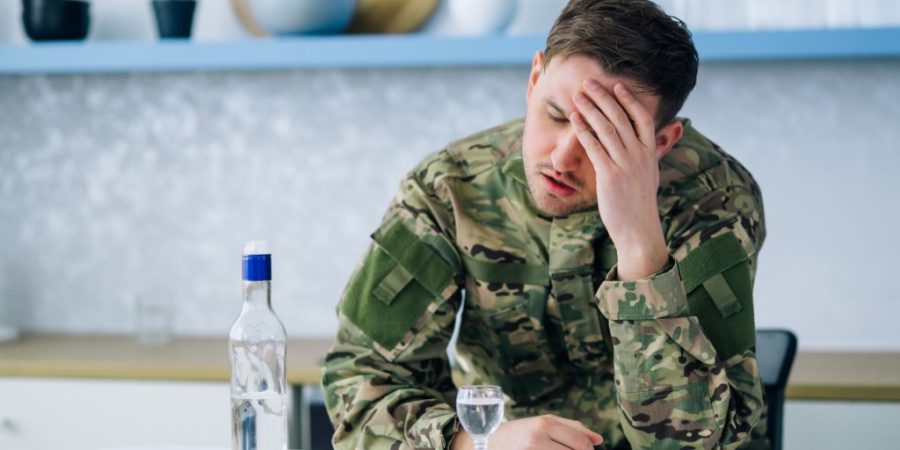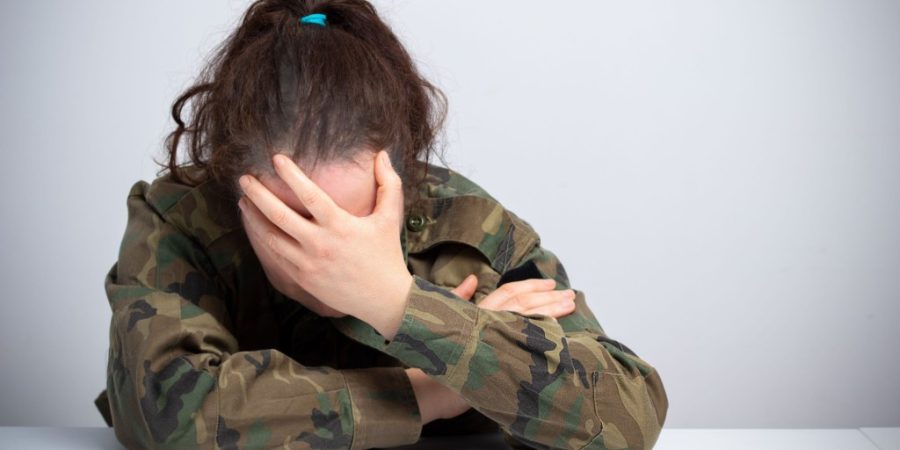

Alcohol and Anxiety: What Veterans Need to Know


According to the National Institute on Alcohol Abuse, as many as one in 10 veterans meet the diagnostic criteria for a substance use disorder, a rate higher than that among civilians. From the stress of deployment to reintegration upon returning home, many veterans struggle to maintain their mental health. The complicated relationship between alcohol and anxiety is one of the main contributors to that struggle. If you’re a veteran seeking help to regain control of your addiction to alcohol and better manage your anxiety, Heroes’ Mile is here to help.
Table of Contents


To start, alcohol is a central nervous system depressant. This means that it slows down your brain activity and impacts mood, behavior, and self-control. Drinking alcohol also makes it harder to think clearly and create memories while inebriated. All of these brain activities are impacted because alcohol influences the receptors and neurotransmitters, causing a disconnect in the brain’s communication pathways. Although you may feel free in the moment, this interaction with chemicals like serotonin will worsen anxiety symptoms once you become sober.
When it comes to panic attacks, consuming large amounts of alcohol can be a trigger. Small amounts can stimulate the neurotransmitter gamma-aminobutyric acid (GABA), the chemical responsible for producing feelings of calmness. Which is why those struggling with a social anxiety disorder feel like they benefit from a drink or two at a social gathering. However, consuming large quantities of alcohol can deplete GABA. This causes feelings of tension and panic to arise, especially if you’re undergoing withdrawal. As a result, alcohol and anxiety don’t mix, even if it makes you feel better for a brief moment.
Alcohol-induced anxiety can last for hours after drinking. Not only can this be unpleasant mentally and physically, but relying on alcohol to cope with an existing anxiety disorder can be dangerous. Those struggling with an anxiety disorder, including PTSD, are at a higher risk of developing an alcohol use disorder. In addition to that, the risk for veterans rises even higher in comparison to the general population due to unique or traumatic experiences that took place during their time in the service.
There are a variety of long-term consequences of alcohol and anxiety. Specifically, people who suffer from anxiety and depression are more likely to feel anxious after drinking.
One significant risk of alcohol abuse and alcoholism are blackouts. Individuals risk blackouts when they drink too much too quickly or engage in binge drinking. Blacking out refers to the gaps in your memory that were events that took place while intoxicated. These gaps result when someone drinks enough to temporarily block the transfer of memories from short-term to long-term storage in the brain. This lack of memories can cause individuals to feel self-conscious because they can’t remember things they said or did. In turn, you may feel the need to drink to cover up feelings of shame or embarrassment that once again trigger your anxiety.
Heavy drinking is an accepted way to not only celebrate milestones, like being promoted, but to also go out and unwind as a group after a long week. While drinking alcohol as a way to bond with peers, ease tension, and unwind isn’t exclusive to military culture, the long-term effects magnify the unique experiences of active-duty military personnel and veterans. Alcoholic beverages tend to be more accessible to young soldiers deployed overseas, which can start an unhealthy relationship with alcohol that continues after retirement.
The longer you rely on alcohol to cope with your anxiety symptoms, the higher your chances of developing an alcohol use disorder become. Moreover, getting stuck in the cycle of drinking to escape overwhelming symptoms of your anxiety, will worsen your symptoms. You may initially feel calm after a few drinks but this slowly turns into alcohol dependence. This in turn causes you to drink more each time to reach the calmness you felt before. However, after a long period of time, you will not be able to remain sober without experiencing withdrawal.
Studies have shown that heavy alcohol consumption increased for those who were deployed to Afghanistan and Iraq. Combat exposure, injury, and other traumatic experiences commonly lead to anxiety disorders. In this case, trauma and addiction or alcohol and anxiety go hand-in-hand. These co-occurring disorders feed into one another as you attempt to cope with the initial anxiety that only worsens as a result of an unhealthy coping mechanism. This overlap makes it difficult to stop alone, which is why comprehensive, veteran-exclusive treatment can help you overcome this battle.
Your treatment may vary depending on the type of anxiety you’re experiencing in addition to the severity of your alcohol use disorder. However, trauma-informed therapy is effective in helping veterans struggling with alcohol and anxiety. The Heroes’ Mile addiction recovery center in DeLand, Florida provides comprehensive care for veterans living with an anxiety disorder and alcohol use disorder.
Some treatment programs available at Heroes’ Mile include:
In addition to these programs, patients have a variety of treatment options proven to be effective in treating addiction to alcohol and anxiety. Additionally, they create healthy outlets for reducing anxiety symptoms. These options include:
Every patient follows a carefully curated treatment program to help them recover at their own pace. With the guidance of addiction specialists, mental health professionals, and additional staff, veterans receive the structure and support they need to treat issues with both alcohol and anxiety. Moreover, veterans can experience camaraderie with fellow veterans in a nurturing environment as they reach recovery milestones together.
Traditional civilian treatment centers may not have the resources necessary to address the complex mental health concerns of veterans. That’s why veterans struggling with their relationship to alcohol and anxiety benefit from the comprehensive services of a veteran-ran recovery center. Here, veterans can recover surrounded by those who share similar experiences and goals.
If you have additional questions about how Heroes’ Mile can help you, call our admissions team at 888-838-6692. Or you can submit a confidential contact form online instead. The team at Heroes’ Mile is here to help you take the first step toward sobriety whenever you’re ready.
The post Alcohol and Anxiety: What Veterans Need to Know appeared first on Heroes’ Mile Veterans Recovery Center.
Source
Original Author: Heroes’ Mile
Pain is a universal experience, but some deal with it more often than others. Every…
For veterans struggling with mental illness and substance use disorders, one of the most beneficial…
If you’re not familiar with art therapy, you may be surprised to learn that it…
Unfortunately, individuals with post-traumatic stress disorder (PTSD) are more likely to experience suicidal thoughts. This type…
Deciding to Enter Inpatient Alcohol or Drug Rehab Choosing to enter an inpatient alcohol or…
What is an eating disorder? Eating disorders include anorexia nervosa, a form of self-starvation; bulimia nervosa, in…